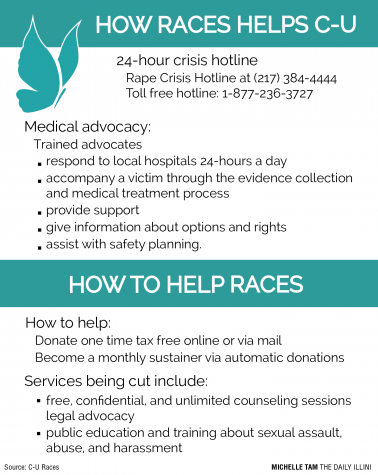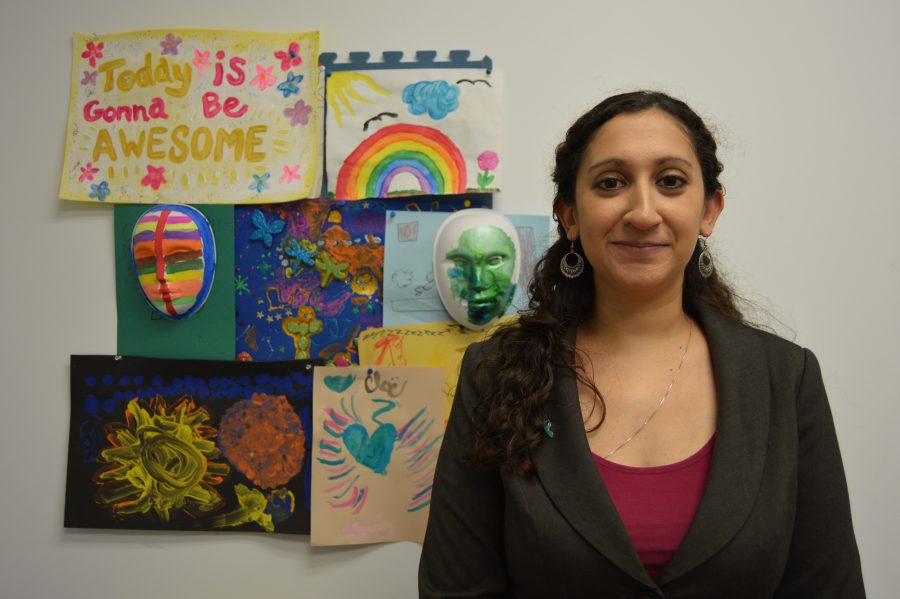RACES doors remain open despite budget cuts
Jaya Kolisetty stands in front of paintings at the Rape Advocacy and Education Service center in Urbana on Sept. 7. RACES runs out of funding on Dec. 31.
September 8, 2016

The budget crisis in Illinois that exploded last spring has left many organizations at the University straining to make ends meet.
Rape Advocacy, Counseling, & Education Services in Urbana is a non-profit whose last remaining staff member feels the repercussions of the lack of funding every day.
Jaya Kolisetty, staff member and public educator with RACES, said there were eight paid staff members, and the organization was anticipating growth before the budget changed.
“There’s been a lot of positive change and then pretty heartbreaking stuff that’s happened,” Kolisetty said. “Now we’re just hopeful to get back to wherever we were and continue to grow.”
The organization can be found inside the Lincoln Square Mall in downtown Urbana. Inside the office are multiple empty rooms, including an area intended for children’s counseling when someone under the age of 18 falls victim to sexual assault.
Get The Daily Illini in your inbox!
Kolisetty explained that one in six adult women and 1 in 33 adult men will be subjected to some type of sexual violence; further, one in four girls and one in six boys will experience some kind of sexual violence before they are 18 years old.
“Everyone knows a survivor, whether they know it or not,” Kolisetty said.
The statistic changes in regard to college students, where one in five females will experience some form of sexual assault while pursuing a higher degree. Kolisetty emphasized that it is not just the University holding this statistic, but that rape culture is an issue worldwide.
Within the first three weeks of the current semester, there have been three reports of sexual assault released by the University police. Joan Fiesta, lieutenant with campus police and past RACES board member, acknowledged the silver lining in these reports.
“We want, and this sounds awful, but we want higher reporting because we know too many people are not being served or sitting in silence when they’ve been victims of sexual assault,” Fiesta said.
The high population of Greek life on campus is a factor that sets the University apart from other universities nationwide. Fiesta explained how she did not want to put Greek life in the driver’s seat in terms of contributing to sexual assault.
“I think if we focus too much on this is a ‘safe place;’ this is an ‘unsafe place,’ we start to lose touch on red flags,” Fiesta said.
Kolisetty said the fight to end sexual assault not only exists in the realms of bystander intervention and response, but that proactive behavior also needs to be taught.
Prior to budget cuts, RACES offered programs for elementary, middle and high schools to teach students at a young age the premises of healthy and respectful social behaviors. The current budgets do not enable RACES to continue to provide these services, and although the schools can advocate for this behavior, Kolisetty noted the value in having a professional visiting these communities to educate them.
“(It is) beyond frustrating, because we know all these services are needed and (we) don’t have the funds to supply all of them,” Kolisetty said.
The two services remaining at the RACES center are the 24-hour crisis hotline and the medical advocacy program. Being able to call the hotline at any time is something that has been a part of the organization since it was founded in 1971. All services have remained completely free and confidential during the last 45 years.
The medical advocacy program is designed for representatives to visit survivors in the hospital. The role of the volunteer or board member is to provide clarity, whether that includes talking through rights, the evidence collection kit or letting survivors know they do not have to disclose anything to the police. Advocates also will bring new clothing to the survivor, because when gathering evidence from the event, survivors sometimes need to return home in hospital gowns.
Kolisetty recognized the privilege of RACES to continue offering confidentiality to survivors, as it is one of the most important aspects in guiding the healing process.
“We are a completely survivor-oriented organization,” Kolisetty said. “What that means is we’re gonna do whatever that person asks us to do.”
This mentality was echoed by Lt. Fiesta on behalf of the University Police.
“We want people to feel like if they come to us we’ll do a good job, and they’ll be treated fairly in the investigation. But we’re still dealing with a lot of different dynamics that keep reporting low,” Fiesta said.
C-U recognized the need for RACES in the community and provided the funds needed to keep the center’s doors open. Kolisetty specifically acknowledged the United Way of Champaign County for a $25,000 emergency funding grant. Thanks to donors and individuals, the organization is not anticipating closure, but is feeling out the speed of rebuilding additional programs.
Dismantling myths about sexual assault is another key chunk in extinguishing rape culture. Kolisetty mentioned how perpetrators can often be imagined as strangers staking out in bushes, looking for the right moment to attack. The unfortunate truth is that it is typically someone the survivor already knows.
“It’s someone who seems normal, is normal, who is making a choice to be violent to another person,” Kolisetty said.
Unsubscribing to misconceptions surrounding sexual assault can increase bystander intervention and lead more survivors to sharing what has happened to them. Disregarding a survivor with doubt, disbelief or shame are some of the key reasons for a lack of speaking up. Kolisetty said studies show 68 percent of sexual assault cases go unreported. She explained believing survivors and being there for them is essential, and far more beneficial than arguing with the person sharing their story.
“So many survivors get gaslighted like that,” she said.
Correction: An earlier version of this story stated that the emergency funding grant was worth $2.500. It is worth $25,000. The Daily Illini regrets the error.







